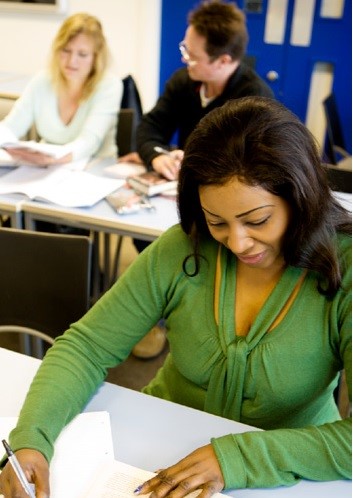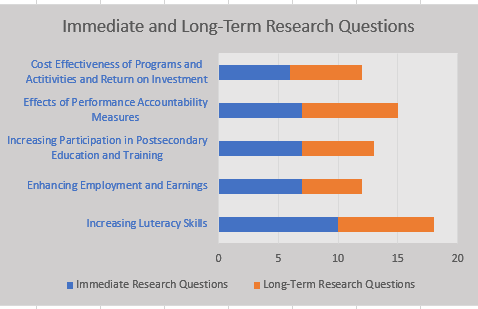Improving Outcomes for Adult Learners
More than 40 percent of adults age 16 or older participate in some form of adult education activities. Safal Partners recently concluded a contract with the national Office of Career, Technical, and Adult Education (OCTAE) in the U.S. Department of Education to conduct research and evaluation on effective adult education and literacy activities. Before this project, there were many studies on adult education activities, but few of the studies were rigorous. Through the OCTAE project, Safal identified critical research questions so that newly funded research would be results-oriented and high quality.
Safal Partners is passionate about our mission of creating Good Outcomes. Through this project with OCTAE, we encouraged federal- and state-funded research that identifies the most effective practices that create positive outcomes for adult learners.
When you look at a few typical people served by adult education, it’s easy to see why this work is critical:

- Veronica Evans* is a middle-aged parent of three from Dallas, who worked full time until she was laid off last month. As a teenager, she completed a few grades of high school but did not graduate before she had her first son. She tried to study for and pass the GED® Test a few years later, but was unsuccessful. Now, she is preparing for the HiSET® high school equivalence test and has a renewed need for further education to improve her job prospects.
- Gloria DelMonte* is an adult education instructor, who is a former middle school teacher. She is working on an online master’s degree in adult education. She cares a lot about her adult learners and their success, and works with them independently and in the school’s computer lab each evening. She tries to keep up with the latest research in adult education but still has many questions.
- Keshaun Olufu* is another adult learner. From an early age Keshaun watched his four younger brothers and sisters in the mornings and after school, and by 18 was raising them on his own. He remembers having trouble concentrating in school and learned only the basics of reading and very little math. He worked odd jobs after school, and when one of his supervisors offered him steady work at the age of 15, he jumped at the chance. Now at the age of 24, Keshaun realizes he will be stuck in the same type of work indefinitely unless he gets more education.
Adult learners in adult education programs were often struggling students and performing below grade-level when they were enrolled in K-12 school, and are now making up for lost time. The clock is ticking and the stakes are high, both at home and in career. Veronica goes to class at the adult education school three nights a week and works in small groups with other adults with similar goals. Keshaun attends class at the adult education program two nights a week, unless his employer requires him to work an evening shift.
The adult education school Veronica and Keshaun attend is funded by state and federal Workforce Innovation and Opportunity Act (WIOA) legislation. Under Title II of WIOA, the Adult Education and Family Literacy Act, states are asked to provide a range of literacy, numeracy, and writing services to adults in need, as well as to guide them on career pathways. The state also receives funds to provide professional learning to instructional staff like Gloria. WIOA requires local programs to provide research-based adult education services to adults like Veronica and Keshaun.
A new requirement of WIOA, which was reauthorized in 2014, is for both states and OCTAE to conduct research and evaluation of effective adult education literacy activities. Safal Partners assisted OCTAE in developing a framework for this inaugural national evaluation effort.
Safal Partners began by connecting research topics to citations from WIOA policy and completed an extensive literature review. In total, 150 selected publications were reviewed, and the rigor of each report was evaluated. Most of the adult education research is descriptive; more rigorous studies on outcomes and effectiveness of services are needed.
Together, OCTAE senior officials and Safal Partners reviewed broad policy requirements and specific education activities under WIOA to frame potential research topics. Employing the resulting crosswalk, OCTAE officials identified five priority research topics:
- Priority 1: To what extent do the adult education and literacy activities increase the literacy skills of eligible adults?
- Priority 2: To what extent do the adult education and literacy activities enhance the employment and earnings of such participants?
- Priority 3: To what extent do adult education and literacy activities lead to enrollment in postsecondary education and training?
- Priority 4: What are the effects of performance accountability measures on programs and activities?
- Priority 5: How cost effective are these programs and activities?
The reviewed literature offered many potential research questions and methodological considerations for these topics. Some research questions lend themselves to being addressed immediately, while others could best be addressed in subsequent years or through longitudinal studies. Safal Partners developed 70 research questions for the priority areas, including 37 immediate and 33 long-term questions for use in planning future research. In employing rigorous methodologies and designs identified during the literature review, adult education researchers will be prepared to address research questions in the priority research topics critical to adult education.

Ultimately, this Safal Partners work in research and evaluation will help instructors like Gloria DelMonte continue their work and professional learning. As Gloria logs on to her online course account, she is eager to find research-based answers to her questions. With Safal Partners’ contribution of a framework, upcoming adult education research and evaluation reports will boost Gloria’s ability to meet the needs of adult learners to make good outcomes, including improved skills and employability for Veronica Evans and Keshaun Olufu.
For Gloria and her adult learners, the research findings cannot come a moment too soon.
*Names changed to protect privacy.
